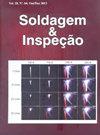The Microstructure and Mechanical Behavior of TRIP 800 and DP 1000 Steels Welded by Electron Beam Welding Method
IF 0.3
4区 材料科学
Q4 METALLURGY & METALLURGICAL ENGINEERING
引用次数: 3
Abstract
2020;25:e2526. https://doi.org/10.1590/0104-9224/SI25.26 Abstract: TRIP 800 steel and DP 1000 steel welded by using the electron beam welding (EBW) method were investigated in this study. Martensite was a dominant phase at the fusion zone (FZ) of both steels. In addition, bainite and austenite were observed in the FZ of TRIP 800. The hardness of FZ and heat affected zone (HAZ) of both steels were higher than their base metals. The hardness of FZ of the TRIP 800 joinings was higher than the FZ of DP 1000. Ductility and tensile strength decreased at both of the joinings. However, this decrease became higher at the DP 1000 steel joinings compared to the TRIP 800 joinings. It was observed that the TRIP 800 joining absorbed more energy than the DP 1000 joining at impact notch test for电子束焊接TRIP 800和DP 1000钢的组织和力学行为
2020; 25: e2526。摘要:研究了TRIP 800钢与DP 1000钢的电子束焊接工艺。两种钢的熔合区均以马氏体为主。此外,TRIP 800的FZ区还观察到贝氏体和奥氏体。两种钢的热影响区和热影响区硬度均高于母材。TRIP 800的FZ硬度高于DP 1000的FZ。两种接头的延展性和抗拉强度均有所下降。然而,与TRIP 800钢接头相比,DP 1000钢接头的降幅更大。在冲击缺口试验中,TRIP 800接头比DP 1000接头吸收更多的能量
本文章由计算机程序翻译,如有差异,请以英文原文为准。
求助全文
约1分钟内获得全文
求助全文
来源期刊

Soldagem & Inspecao
工程技术-冶金工程
CiteScore
1.00
自引率
16.70%
发文量
13
审稿时长
12 weeks
期刊介绍:
The Journal Soldagem & Inspeção (S&I) js a techno-scientific journal created in 1995. Printed issues of this journal are distributed free of charge to libraries in Brazil, Latin America and the Iberian Peninsula. It has been printed regularly every quarter since September, 2002, and, since the beginning of 2007, its electronic version is available in the address: (http://www.abs-soldagem.org.br/s&i/). The journal is sponsored by the Brazilian Welding Association (ABS).
Since its creation several well known professionals working in welding contributed with the Journal Soldagem & Inspeção and its editorial board crosses the Brazilian borders. During its evolution the Journal received ta special contribution from the Editors-in-chief : Ronaldo Paranhos, Américo Scoti, Paulo Modenesi e Alexandre Bracarence. Since January 2012 the Editor-in-chief is Ana Sofia C. M. D’Oliveira, Full professor at Universidade Federal do Paraná (UFPR) . Her work focus mainly on Hardfacing and Physical Metallurgy. The jornal Soldagem & Inspeção also counts with 10 Associate Editors and a fix Editorial board of referees. short-term (Ad Hoc) referees can be invited to evaluate some papers submitted to the journal.
The Soldagem & Inspeção journal is the scientific divulgation channel of the Brazilian Welding Association (ABS). It aims to publish original papers related to the scientific and technological development of welding, inspection, and related fields. Review papers or letters on current and controversial subjects are also published in the Journal.
Its abbreviated title is Soldag. insp. (Impr.), which should be used in bibliographies, footnotes and bibliographical references and strips.
 求助内容:
求助内容: 应助结果提醒方式:
应助结果提醒方式:


